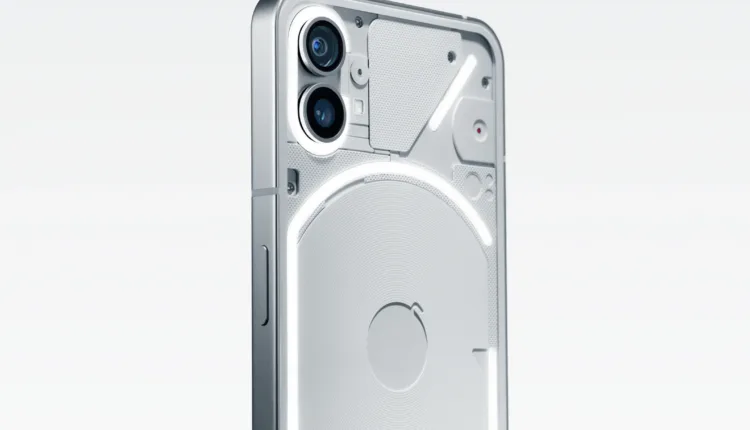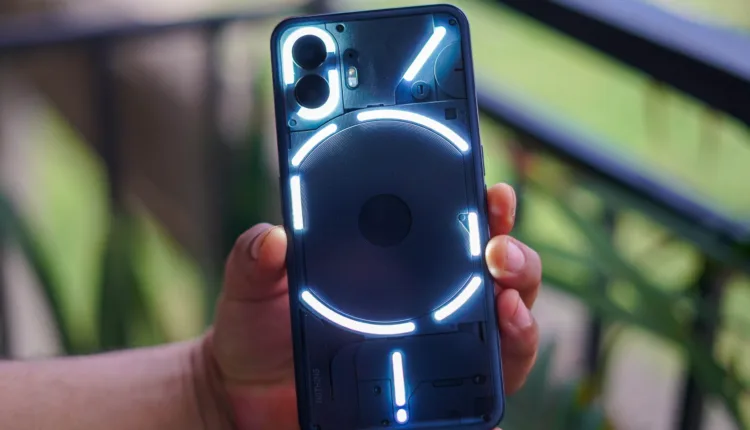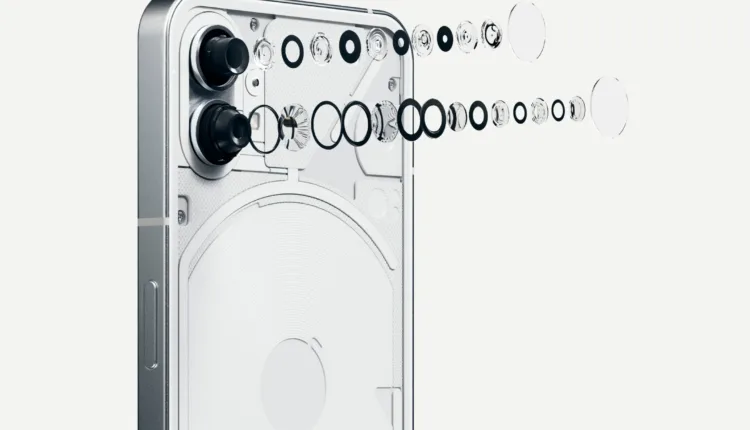Nothing Phone 1 vs Nothing Phone 2: A Comprehensive Comparison
In the ever-evolving world of smartphones, competition is fierce, and innovative features are constantly emerging. Nothing, a tech startup led by OnePlus co-founder Carl Pei, entered the smartphone arena with its unique and transparent design approach. Their journey began with the Nothing Phone 1, which was followed by the Nothing Phone 2. In this detailed comparison, we will analyze these two smartphones across various critical parameters, helping you decide which one suits your needs better.

| – | – | – | |
| Specifications | Nothing Phone 1 |
Nothing Phone 2
|
|
| Network Technology | GSM / HSPA / LTE / 5G |
GSM / HSPA / LTE / 5G
|
|
| Launch | Announced: July 12, 2022 |
Announced: July 11, 2023
|
|
| Released: July 16, 2022 |
Released: July 17, 2023
|
||
| Body Dimensions | 159.2 x 75.8 x 8.3 mm |
162.1 x 76.4 x 8.6 mm
|
|
| Weight | 193.5 g | 201.2 g | |
| Build | Glass front (Gorilla Glass 5), |
Glass front (Gorilla Glass),
|
|
| glass back (Gorilla Glass 5), |
glass back (Gorilla Glass),
|
||
| aluminum frame | aluminum frame | ||
| SIM | Dual SIM (Nano-SIM, |
Dual SIM (Nano-SIM,
|
|
| dual stand-by) | dual stand-by) | ||
| Display Type | OLED | LTPO OLED | |
| Display Colors | 1B colors | 1B colors | |
| Display Refresh Rate | 120Hz | 120Hz | |
| Display HDR Support | HDR10+ | HDR10+ | |
| Display Size | 6.55 inches | 6.7 inches | |
| Display Resolution | 1080 x 2400 pixels |
1080 x 2412 pixels
|
|
| Display PPI Density | ~402 ppi | ~394 ppi | |
| Display Protection | Corning Gorilla Glass 5 |
Corning Gorilla Glass
|
|
| Platform OS | Android 12 (upgradable to |
Android 13, Nothing OS 2.0.2a
|
|
| Android 13, Nothing OS 2.0) | |||
| Chipset | Qualcomm SM7325-AE Snapdragon |
Qualcomm SM8475 Snapdragon 8+
|
|
| 778G+ 5G (6 nm) | Gen 1 (4 nm) | ||
| CPU | Octa-core (1×2.5 GHz Cortex- |
Octa-core (1×3.0 GHz Cortex-
|
|
| A78 & 3×2.4 GHz Cortex-A78 & |
X2 & 3×2.5 GHz Cortex-A710 &
|
||
| 4×1.9 GHz Cortex-A55) |
4×1.80 GHz Cortex-A510)
|
||
| GPU | Adreno 642L | Adreno 730 | |
| Memory Card Slot | No | No | |
| Internal Storage | 128GB 8GB RAM, 256GB 8GB RAM, |
128GB 8GB RAM, 256GB 12GB RAM,
|
|
| 256GB 12GB RAM |
512GB 12GB RAM
|
||
| Main Camera Modules | 50 MP wide, 50 MP ultrawide |
50 MP wide, 50 MP ultrawide
|
|
| Main Camera Features | LED flash, panorama, HDR |
LED flash, panorama, HDR
|
|
| Main Camera Video | 4K@30fps, 1080p@30/60fps, gyro- |
4K@30/60fps, 1080p@30/60fps,
|
|
| EIS, live HDR |
gyro-EIS, live HDR, OIS
|
||
| Selfie Camera Modules | 16 MP wide | 32 MP wide | |
| Selfie Camera Features | HDR | HDR | |
| Selfie Camera Video | 1080p@30fps | 1080p@30fps | |
| Loudspeaker | Yes, with stereo speakers |
Yes, with stereo speakers
|
|
| 3.5mm Jack | No | No | |
| WLAN | Wi-Fi 802.11 a/b/g/n/ac/6, |
Wi-Fi 802.11 a/b/g/n/ac/6,
|
|
| dual-band |
dual-band, Wi-Fi Direct
|
||
| Bluetooth | 5.2, A2DP, LE | 5.3, A2DP, LE | |
| Positioning | GPS (L1), GLONASS (L1), BDS |
GPS (L1+L5), GLONASS (L1), BDS
|
|
| (B1I+B1c), GALILEO (E1), QZSS |
(B1I+B1c), GALILEO (E1), QZSS
|
||
| (L1) | (L1), NavIC | ||
| NFC | Yes | Yes | |
| Infrared Port | No | No | |
| Radio | No | No | |
| USB | USB Type-C 2.0, OTG |
USB Type-C 2.0, OTG
|
|
| Battery Type | Li-Ion 4500 mAh, non- |
Li-Ion 4700 mAh, non-
|
|
| removable (17.42 Wh) | removable | ||
| Charging | 33W wired, PD3.0, QC4, 50% in |
45W wired, PD3.0, PPS, QC4,
|
|
| 30 min, 100% in 70 min | 100% in 55 min | ||
| (advertised) | (advertised) | ||
| Stand-by | |||
| Talk Time | |||
| Colors | White, Black |
White, Dark Gray
|
|
| SAR (Head/Body) | 1.29 W/kg (head), 1.09 W/kg |
0.99 W/kg (head), 1.48 W/kg
|
|
| (body) | (body) | ||
| Models | A063 | A065 | |
| Price | ₹ 29,999 / $ 360.00 / £ 309.00 |
₹ 51,487 / $ 675.00 / £ 629.00
|
|
| / € 349.00 | / € 693.63 | ||
| Performance (Benchmark) | AnTuTu: 592789 (v9) |
AnTuTu: 895434 (v9),
|
|
| GeekBench: 3024 (v5.1) | 972126 (v10) | ||
| GFXBench: 33fps (ES 3.1 |
GeekBench: 3957 (v5.5),
|
||
| onscreen) | 4219 (v6.0) | ||
| Display Contrast Ratio | Infinite (nominal) |
Infinite (nominal)
|
|
| Loudspeaker Sound (LUFS) | -24.4 LUFS (Very good) |
-23.9 LUFS (Very good)
|
|
| Battery Life (Endurance) | 108h endurance rating |
103h endurance rating
|
Introduction to Nothing Phone 1 and Nothing Phone 2
Nothing Phone 1

Nothing 1
Announced: July 12, 2022
Released: July 16, 2022
Dimensions: 159.2 x 75.8 x 8.3 mm
Weight: 193.5 g
Build: Glass front (Gorilla Glass 5), glass back (Gorilla Glass 5), aluminum frame
Display: 6.55 inches OLED, 120Hz, HDR10+
OS: Android 12 (upgradable to Android 13), Nothing OS 2.0
Chipset: Qualcomm Snapdragon 778G+ 5G
Memory: 128GB 8GB RAM, 256GB 8GB RAM, 256GB 12GB RAM
Main Camera: Dual 50 MP (wide and ultrawide)
Selfie Camera: 16 MP
Battery: Li-Ion 4500 mAh
Charging: 33W wired, 15W wireless, 5W reverse wireless
Price: ₹ 29,999
Nothing Phone 2

Nothing 2
- Announced: July 11, 2023
Released: July 17, 2023
Dimensions: 162.1 x 76.4 x 8.6 mm
Weight: 201.2 g
Build: Glass front (Gorilla Glass), glass back (Gorilla Glass), aluminum frame
Display: 6.7 inches LTPO OLED, 120Hz, HDR10+
OS: Android 13, Nothing OS 2.0.2a
Chipset: Qualcomm Snapdragon 8+ Gen 1
Memory: 128GB 8GB RAM, 256GB 12GB RAM, 512GB 12GB RAM
Main Camera: Dual 50 MP (wide and ultrawide)
Selfie Camera: 32 MP
Battery: Li-Ion 4700 mAh
Charging: 45W wired, 15W wireless, 5W reverse wireless
Price: ₹ 51,487
Design and Build Quality
When it comes to design and build quality, both Nothing Phone 1 and Nothing Phone 2 excel. They feature a unique transparent back that showcases internal components, giving them a futuristic and distinct appearance. However, there are some subtle differences between the two:
- Nothing Phone 1: Slightly smaller and lighter with dimensions of 159.2 x 75.8 x 8.3 mm and a weight of 193.5 g. It has IP53 splash, water, and dust resistance.
- Nothing Phone 2: Slightly larger and heavier with dimensions of 162.1 x 76.4 x 8.6 mm and a weight of 201.2 g. It offers IP54 splash, water, and dust resistance.
Both phones incorporate the Glyph Interface, a series of LEDs on the back that not only adds to the aesthetics but also provides functional features like notifications and charging progress indicators.
Display Quality
The display is a critical aspect of any smartphone, and both Nothing Phone 1 and Nothing Phone 2 deliver impressive visuals. Here’s a comparison of their display specifications:
- Nothing Phone 1: Features a 6.55-inch OLED display with a 120Hz refresh rate, HDR10+ support, 1080 x 2400 pixels resolution, and Corning Gorilla Glass 5 protection. It offers a peak brightness of 1200 nits.
- Nothing Phone 2: Offers a larger 6.7-inch LTPO OLED display with a 120Hz refresh rate, HDR10+ support, 1080 x 2412 pixels resolution, and Corning Gorilla Glass protection. It boasts a higher peak brightness of 1600 nits (HBM).
While both phones provide excellent displays with vibrant colors and smooth scrolling, the Nothing Phone 2’s higher peak brightness makes it more suitable for outdoor use, ensuring visibility even in bright sunlight.
Performance and Software
Performance is a key factor in determining the overall user experience. Here’s how Nothing Phone 1 and Nothing Phone 2 compare in terms of performance and software:
- Nothing Phone 1: Powered by the Qualcomm Snapdragon 778G+ 5G chipset, featuring an octa-core CPU and Adreno 642L GPU. It runs Android 12, upgradable to Android 13, with Nothing OS 2.0.
- Nothing Phone 2: Equipped with the Qualcomm Snapdragon 8+ Gen 1 chipset, featuring an octa-core CPU and Adreno 730 GPU. It runs Android 13 out of the box with Nothing OS 2.0.2a.
The upgrade to the Snapdragon 8+ Gen 1 in Nothing Phone 2 ensures smoother multitasking and gaming performance compared to the Snapdragon 778G+ in Nothing Phone 1. Additionally, Nothing Phone 2 ships with Android 13, providing the latest software experience.
Camera Capabilities
Both Nothing Phone 1 and Nothing Phone 2 feature dual-camera setups, with improvements made in the second-generation model. Here’s a comparison of their camera specifications:
- Nothing Phone 1: Main Camera – 50 MP wide and 50 MP ultrawide, with features like PDAF, OIS, LED flash, panorama, and HDR. Selfie Camera – 16 MP.
- Nothing Phone 2: Main Camera – 50 MP wide and 50 MP ultrawide, with features like PDAF, OIS, LED flash, panorama, and HDR. Selfie Camera – 32 MP.
The Nothing Phone 2’s upgraded selfie camera and optimized sensor performance result in better image quality, especially in well-lit conditions. However, both phones deliver impressive camera capabilities given their respective price points.
Battery Life and Charging
Battery life and charging speed are crucial factors for users who rely on their smartphones throughout the day. Here’s how Nothing Phone 1 and Nothing Phone 2 compare in this aspect:
- Nothing Phone 1: Equipped with a 4500 mAh battery, it supports 33W wired charging, 15W wireless charging, and 5W reverse wireless charging.
- Nothing Phone 2: Features a larger 4700 mAh battery, supporting 45W wired charging, 15W wireless charging, and 5W reverse wireless charging.
The larger battery capacity and faster wired charging of Nothing Phone 2 provide an advantage in terms of battery life and convenience. It can be charged to 100% in just 55 minutes, making it a suitable choice for users on the
go.
Connectivity and Other Features
Both Nothing Phone 1 and Nothing Phone 2 offer a range of connectivity options and additional features:
Connectivity: Both phones support 5G connectivity, ensuring faster data speeds and low latency. They also include Wi-Fi 6, Bluetooth 5.x, NFC, and USB Type-C 2.0 for seamless connectivity.
Other Features: Both phones feature stereo speakers, fingerprint sensors under the display, and a range of sensors like accelerometer, proximity, gyro, and compass.
Price Comparison
One of the key factors in choosing between Nothing Phone 1 and Nothing Phone 2 is the price:
Nothing Phone 1: Priced at ₹ 29,999, making it a budget-friendly option with competitive features.
Nothing Phone 2: Priced at ₹ 51,487, positioning it as a premium smartphone with enhanced specifications.
Conclusion
In conclusion, both Nothing Phone 1 and Nothing Phone 2 have their own set of advantages, catering to different user preferences and budgets. While Nothing Phone 1 offers a more budget-friendly option with respectable features, Nothing Phone 2 stands out with its upgraded performance, camera, and battery capabilities. The choice ultimately depends on your priorities, whether it’s a budget-conscious decision or a desire for the latest technology and premium features. Nothing Phone 2 is a clear winner in terms of performance and the latest software, but Nothing Phone 1 remains a solid choice for users looking for a more affordable smartphone without compromising on quality.
